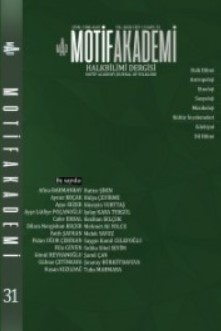BİLGELİĞİN TACINI TAKAN ALP SALUR KAZAN
ALP SALUR KAZAN WEARING THE CROWN OF WISDOM
Author(s): Işılay KARA TEKGÜL, Aynur KoçakSubject(s): Cultural history, Customs / Folklore, Turkish Literature, 13th to 14th Centuries, 15th Century, Theory of Literature
Published by: Motif Halk Oyunları Eğitim ve Öğretim Vakfı
Keywords: Dede Korkut stories; Salur Kazan; archetype; scary mother; individuation;
Summary/Abstract: From the stories of the Book of Dede Korkut, which are processed layer by layer and fascinated by reading, ancient meanings that light on the field of humanity shine. The stories in which Salur Kazan plays an active role are also a unique part of this glowing cause. Salur Kazan mentioned in the stories with many admirable attributes is one of the Inner Oghuz lords and the governor of the Inner-Oghuz and Outer-Oghuz. Through him, all the features of the alp type come to life physically and spiritually. While there is information in different written sources about Salur Kazan killing a dragon, the full text of the story finally reached with the Turkistan / Turkmen Copy. The story titled "Salur Kazan Killing the Seven-Headed Dragon", referred to as the 13th Clan, is about the fight of Salur Kazan with a dragon. In hero-centred narratives, the creature and struggle process that hero fights are conveyed with various symbols. The common meaning of all symbols emphasizes the completion of the hero's journey by performing his individualization. The concept of individuation is shaped by certain archetypal phases in analytical psychology. Successful completion of the phases is vital for the hero's self-perception. If Salur Kazan's Killing of the Seven-Headed Dragon is resolved by elements of analytical psychology, the dragon-fighting symbol represents the hero's battle against the dark aspects of his psyche. The events that took place in this struggle of Kazan are the journey of a hero from the level of consciousness towards the unconscious. Salur Kazan, a real alp; He aspires to discover the nooks of his psyche, to become enlightened and to become a wise leader. At the end of the story, Kazan defeats the dragon, thereby achieving victory by recognizing his self and completing the stages of individuation. The great treasure earned at the end of the difficult struggle is "knowing yourself", an ancient crown that is the necessity of wisdom. With this narrative, it will be possible to mention Salur Kazan as the "wise alp" type.
Journal: Motif Akademi Halkbilimi Dergisi
- Issue Year: 13/2020
- Issue No: 31
- Page Range: 960-976
- Page Count: 17
- Language: Turkish

